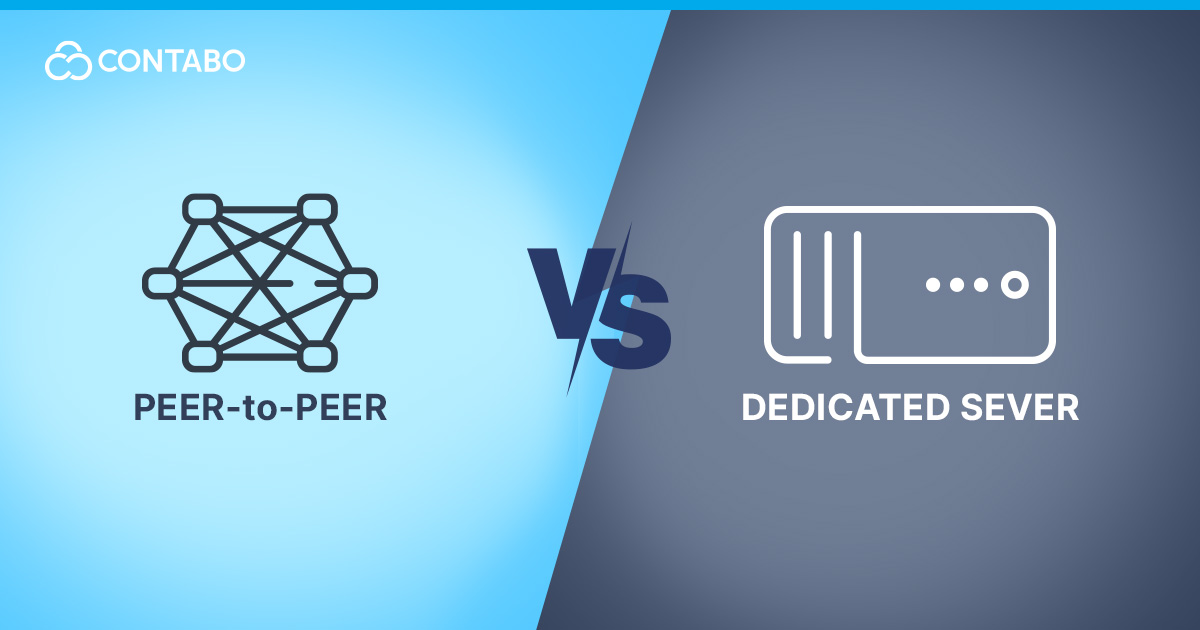
Choosing between peer-to-peer (P2P) and dedicated server architectures is more than a technical decision; it’s a strategic choice that can shape an organization’s digital efficiency and scalability. Both models offer unique benefits, but they also cater to different needs in terms of performance, security, and cost-effectiveness. As businesses expand their digital footprints and seek more effective ways to manage data and communication, the choice becomes crucial.
Understanding Peer-to-Peer Networks
Peer-to-Peer Definition and Key Features
Peer-to-Peer (P2P) networks are characterized by a decentralized model where each participant, or “peer,” acts as both a client and a server. This model allows for the direct sharing of resources like bandwidth, storage, and processing power among all nodes in the network without requiring a central coordinating server. P2P networks are inherently resilient, as they can continue to function even if several nodes fail or disconnect.
Peer-to-Peer Common Use Cases
P2P networks are ideal for applications where individual nodes benefit from mutual resource sharing. Common use cases include file-sharing applications, such as torrent services, where users share pieces of files with each other to enable faster downloads. Additionally, P2P technology is used in blockchain systems, where it enhances security and data integrity across distributed ledgers.
Advantages of Peer-to-Peer Networks
One of the major advantages of P2P networks is their scalability. As more peers join the network, the total system capacity increases, making it more robust and capable of handling larger amounts of data. Additionally, P2P networks can be more cost-effective, as they do not require investment in dedicated server hardware and maintenance.
Limitations of Peer-to-Peer Networks
However, P2P networks also have their drawbacks. Security can be a significant concern, as the decentralized nature makes it challenging to enforce consistent security protocols across all nodes. Privacy issues may arise since shared data can potentially be accessed by any peer in the network. Furthermore, the performance of P2P networks can be inconsistent, depending on the number and reliability of the peers connected at any given time.
Exploring Dedicated Server Networks
Definition and Key Features of Dedicated Server Networks
Dedicated server networks operate on a central server model where one or more servers are exclusively reserved for serving the needs of their network. Unlike P2P networks, dedicated servers provide centralized resources, control, and data management, which can be tailored to specific organizational requirements. This model ensures that all data flows through a central point, making it easier to manage and secure.
Common Use Cases of Dedicated Servers
Dedicated servers are commonly used in environments requiring high reliability and control, such as corporate data centers, web hosting, and large-scale e-commerce sites. They are also prevalent in gaming, where dedicated servers are used to host multiplayer games, providing a stable and controlled platform for players.
Advantages of Dedicated Servers
Dedicated servers offer enhanced performance stability and are capable of handling high volumes of traffic with consistent service quality. They also provide superior security and privacy, as administrators have full control over the server’s setup and security protocols. Moreover, the dedicated nature ensures that resources are not shared with other clients, leading to better performance and reliability.
Limitations of Dedicated Servers
However, the centralized nature of dedicated servers can be a disadvantage in scenarios where redundancy and fault tolerance are critical. If the server goes down, all services relying on it will be affected. Additionally, dedicated servers require a significant initial and ongoing financial investment in hardware, software, and professional management.
Peer-to-Peer vs. Dedicated Servers – Comparative Analysis
Speed and Performance
When comparing speed and performance, dedicated servers often have the edge due to their robust infrastructure and the ability to optimize hardware specifically for the tasks at hand. They provide consistent performance, which is important for applications demanding high reliability and speed, such as high-traffic websites or enterprise databases.
In contrast, the performance of Peer-to-Peer networks can vary significantly. While they can potentially increase in efficiency as more nodes join the network, the speed and performance depend heavily on the individual peers’ bandwidth and hardware capabilities. This variability can make P2P networks less predictable in performance critical environments.
Scalability
Scalability is one of the standout features of P2P networks. They scale easily and inexpensively because each new peer adds additional resources to the network. This distributed nature allows P2P networks to handle growth dynamically and cost-effectively.
Dedicated servers, while highly scalable, often require substantial investment in additional hardware and infrastructure to scale up, as well as potential downtime or migration issues during upgrades.
Security
Security is a paramount concern in any network architecture. Dedicated servers offer superior control over security policies and protections, making them ideal for handling sensitive data or compliance-heavy industries. The centralized control allows for comprehensive security measures, which are easier to update and manage.
P2P networks, by nature, face more significant security challenges. The decentralization that makes them resilient and scalable also introduces vulnerabilities, as each peer could potentially become a vector for attacks or data breaches.
Cost Considerations
From a cost perspective, P2P networks typically require less capital outlay because they utilize existing resources of the peer devices. There’s often no need for large initial investments in hardware or ongoing costs related to maintenance of central servers.
Conversely, dedicated servers involve higher initial setup and maintenance costs. However, for organizations that require guaranteed uptime, performance, and security, these costs are often justified as part of their operational needs.
Maintenance and Management
Maintenance and management of dedicated servers are more straightforward due to their centralized nature. It allows IT teams to deploy updates and manage configurations from a single point of control. In contrast, maintaining a P2P network can be more complex, requiring more sophisticated software solutions to manage and update disparate nodes effectively.
Analysis Summary
| Feature | Peer-to-Peer Networks | Dedicated Servers |
| Speed and Performance | Variable, dependent on peers’ capabilities | Consistently high, with optimized infrastructure |
| Scalability | High, with minimal cost as new peers add resources | High, but requires significant investment and planning |
| Security | More vulnerable due to decentralization | Enhanced, with centralized control over policies |
| Cost | Lower initial investment and operational costs | Higher initial and ongoing costs |
| Maintenance and Management | More complex due to distributed nature | Simpler, with centralized management |
Peer-to-Peer & Dedicated Server Use Cases
Dedicated Server Use Cases
Web Hosting: Dedicated servers provide a stable, reliable environment for hosting websites, especially those experiencing high traffic volumes or requiring extensive database interaction. This environment ensures uptime and quick access to data, which is key for maintaining user satisfaction and SEO rankings.
Enterprise Applications: Large organizations often use dedicated servers for their enterprise applications. These servers support complex applications like ERP (Enterprise Resource Planning) and CRM (Customer Relationship Management), which demand consistent performance and high levels of security.
Gaming Servers: In the gaming industry, dedicated servers host multiplayer games, providing consistent latency and performance, which are vital for a fair and competitive gaming experience. They also allow game developers to control the game environment more effectively.
Streaming Services: For streaming media, dedicated servers provide the necessary bandwidth and speed to deliver content smoothly and without interruption, which is important for maintaining viewer engagement.
Peer-to-Peer Use Cases
File Sharing: One of the most common uses of P2P technology is file sharing, as seen with torrent applications. This setup allows users to download and upload files from multiple sources simultaneously, optimizing the transfer speed and efficiency.
Blockchain Applications: Blockchain technology uses P2P networks to distribute a ledger across numerous nodes, enhancing security and integrity by preventing any single point of failure. This is essential for cryptocurrencies and other decentralized applications.
Mesh Networking: In areas lacking infrastructure, P2P networks can form the basis of mesh networks, which connect devices directly to spread internet access or communications capabilities across a large area without central internet service.
Content Distribution Networks (CDNs): Some CDNs utilize P2P to distribute content efficiently. They cache content on multiple peer nodes. This reduces bandwidth costs and improves access speed for users geographically distant from the original source.
Conclusion
Peer-to-Peer Networks: These are ideal for scalable, cost-effective solutions where decentralized data sharing is advantageous. They excel in environments like file sharing and blockchain applications, where system resilience and distributed data are beneficial. However, they can pose challenges in terms of security and performance consistency.
Dedicated Servers: Dedicated servers deliver robust performance and security. They suit tasks that require high reliability and control. Examples include web hosting, enterprise applications, and gaming servers. While they involve higher initial and maintenance costs, their stability and scalability make them preferred for critical business operations.
The choice between P2P and dedicated servers largely depends on specific needs, budget, and scalability requirements. This applies to the business or application in question. System administrators should consider these factors carefully. They need to select the network type that best meets their operational objectives and security standards.
